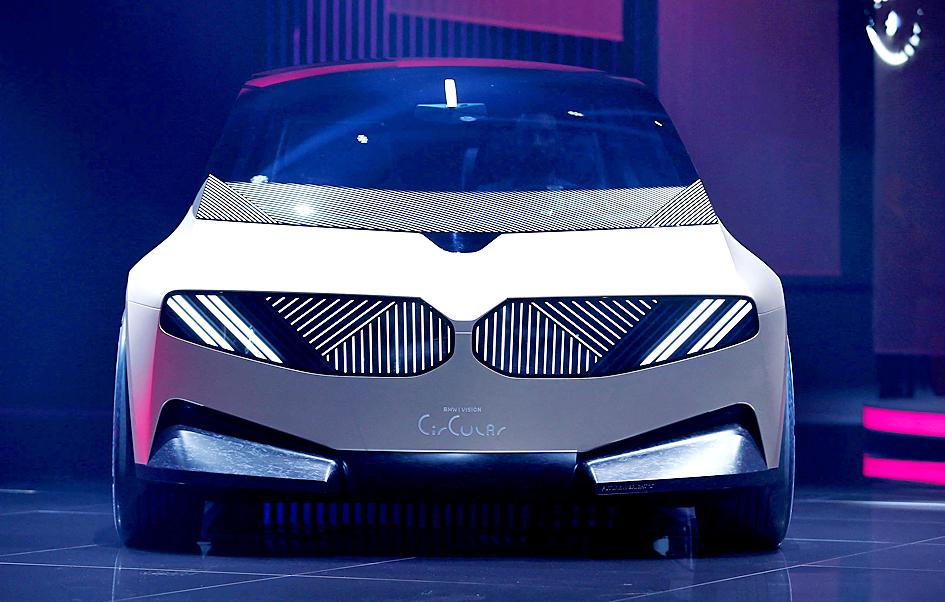BMW AG posted record annual sales in China as demand for luxury vehicles and the automaker’s push into electric vehicles helped overcome challenges posed by a global chip shortage and COVID-19 outbreaks.
The German automaker last year delivered more than 846,000 BMW and Mini vehicles with its Chinese partners, up 9 percent from the previous year, it said in a statement yesterday.
Sales of new-energy vehicles surged 70 percent to about 48,000 units, it said.

Photo: Reuters
The figures are reflective of the broader auto market.
While total sales rose 4.5 percent last year for the first annual gain since 2018, deliveries of new-energy vehicles, including electric vehicles, surged 169 percent to 2.99 million units, China Passenger Car Association data released on Tuesday showed.
The association forecast that new-energy vehicle sales would hit 5.5 million this year.
BMW aims to bring seven new-energy models to the Chinese market this year, including the locally produced iX and iX3.
The company’s record deliveries showed how premium brands have been more resilient to the chip shortage and supply chain pressures.
Volkswagen AG’s Porsche, Bentley and Lamborghini marques all set annual sales records in China last year, while its main VW brand, including Jetta, posted a 15 percent decline.
BMW is set to increase its stake in its joint venture with local partner Brilliance China Automotive Holdings Ltd (華晨中國汽車控股) to 75 percent from 50 percent, after the Chinese government removed the cap that has for decades restricted global brands’ access to the world’s largest vehicle market.
Globally, BMW beat long-time rival Mercedes-Benz to the luxury vehicle sales crown for the first time since 2015, delivering 2.2 million units last year after better navigating the semiconductor shortage.

To many, Tatu City on the outskirts of Nairobi looks like a success. The first city entirely built by a private company to be operational in east Africa, with about 25,000 people living and working there, it accounts for about two-thirds of all foreign investment in Kenya. Its low-tax status has attracted more than 100 businesses including Heineken, coffee brand Dormans, and the biggest call-center and cold-chain transport firms in the region. However, to some local politicians, Tatu City has looked more like a target for extortion. A parade of governors have demanded land worth millions of dollars in exchange

An Indonesian animated movie is smashing regional box office records and could be set for wider success as it prepares to open beyond the Southeast Asian archipelago’s silver screens. Jumbo — a film based on the adventures of main character, Don, a large orphaned Indonesian boy facing bullying at school — last month became the highest-grossing Southeast Asian animated film, raking in more than US$8 million. Released at the end of March to coincide with the Eid holidays after the Islamic fasting month of Ramadan, the movie has hit 8 million ticket sales, the third-highest in Indonesian cinema history, Film

Taiwan Semiconductor Manufacturing Co’s (TSMC, 台積電) revenue jumped 48 percent last month, underscoring how electronics firms scrambled to acquire essential components before global tariffs took effect. The main chipmaker for Apple Inc and Nvidia Corp reported monthly sales of NT$349.6 billion (US$11.6 billion). That compares with the average analysts’ estimate for a 38 percent rise in second-quarter revenue. US President Donald Trump’s trade war is prompting economists to retool GDP forecasts worldwide, casting doubt over the outlook for everything from iPhone demand to computing and datacenter construction. However, TSMC — a barometer for global tech spending given its central role in the

Alchip Technologies Ltd (世芯), an application-specific integrated circuit (ASIC) designer specializing in server chips, expects revenue to decline this year due to sagging demand for 5-nanometer artificial intelligence (AI) chips from a North America-based major customer, a company executive said yesterday. That would be the first contraction in revenue for Alchip as it has been enjoying strong revenue growth over the past few years, benefiting from cloud-service providers’ moves to reduce dependence on Nvidia Corp’s expensive AI chips by building their own AI accelerator by outsourcing chip design. The 5-nanometer chip was supposed to be a new growth engine as the lifecycle